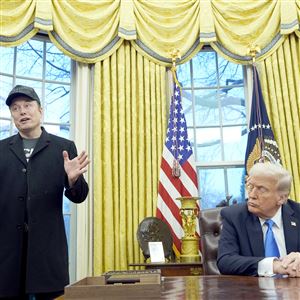WASHINGTON — The document carried the title “A Roadmap to Repeal,” a concise list of Obama administration environmental regulations that a Koch brothers-backed group was pressing President Donald Trump and Congress to quickly reverse after Inauguration Day.
It was a tally of rules that energy industry executives and lobbyists had waged a futile fight against for eight years, donating millions of dollars to lawmakers who vowed to help block them, filing lawsuits to try to overturn them and hiring experts to generate reports that questioned the need for them.
But in a flurry of activity this past week, Congress did what Charles G. and David H. Koch — who own a conglomerate that sells hundreds of products, including gasoline, jet fuel and coal — and other industry leaders had been asking for.
Using a rarely invoked law, the Republican-controlled Congress nullified a measure intended to curb the venting of gas wells on federal lands, and began the process of rolling back other regulations, including one enacted to limit damage that coal mines cause to streams — each items on the “Roadmap to Repeal.”
On Friday, with his own executive orders, Mr. Trump took up two more items on the list, including a call to rewrite major provisions of the Dodd-Frank Act, legislation crafted by the Obama administration and passed by Congress in response to the 2008 financial meltdown.
Not since the Reagan administration has Washington moved so quickly to roll back or nullify so many federal regulations, one of the clearest signs of an abrupt shift of power in a government under one-party control that has flipped the script of winners and losers.
“It is a big, fat victory, after all this time,” said Luke Popovich, a vice president at the National Mining Association, an industry trade group.
A three-way alliance has been formed among Congress, the Trump administration and industries that struggled to reverse what they saw as an out-of-control rush to regulate by the Obama administration.
This new alignment of power is causing alarm among not only environmental groups but also other — mostly liberal — advocates who have spent much of the past eight years pushing for new rules to cover Wall Street banks, broadband providers, teacher preparation requirements, prepaid credit cards and even companies that sell high-calorie foods in vending machines.
All of these measures, and many others, stand a chance of being reversed, watered down or blocked.
“For the last several years, whenever Congress would concoct some way to roll back a rule protecting clean air or clean water or undermine the fight against climate change, we always felt confident as we had an adult in charge at the White House,” said Michael Brune, executive director of the Sierra Club, an environmental group. “Now, what used to be a wish list of the oil and coal and gas industry has become the to-do list for Congress and the White House.”
For Republicans, these first moves are the easy part, made possible by a law that gives Congress the power to reverse regulations within 60 legislative days with a simple majority vote in the House and Senate. Other Republican efforts to exploit this 20-year-old law — which until this week had been used only once to nullify a new rule — were thwarted five times with vetoes by President Barack Obama since 2015.
Once the 60-day window expires, Republicans will have a harder time reversing Obama’s regulations, but will still have tools at their disposal, including cutting financing for the enforcement of rules, issuing new rules that are weaker, or negotiating with Democrats to pass new legislation.
They have bold ambitions, including rescinding a rule enacted by the Obama administration that could close dozens of coal burning power plants, and another that would extend overtime pay eligibility to an estimated 4 million Americans.
“Even on the way out the door, the former administration’s regulatory onslaught continued as they pushed through more midnight regulations,” Senate Majority Leader Mitch McConnell, R-Ky., said Wednesday, as he urged his colleagues to reverse the coal mining regulation, known as the Stream Buffer Rule. “Fortunately, with a new president, we now have the opportunity to give the American people relief and our economy a boost.”
Lobbyists for the extraction industry — oil, gas, coal and other mining operations — said they were as surprised as anyone else by the outcome of the November election, which gave them new clout in Washington.
“A lot of us folks just did not anticipate we were going to be doing this,” said Stephen Brown, a lobbyist at Tesoro, an oil refining and marketing company based in San Antonio. “It was like the dog that caught up with the UPS truck.”
Within days of the election, conference calls and meetings between industry lobbyists, members of Trump’s transition teams and key Republican staff members on Capitol Hill were taking place. Those who took part began to plot out which regulations they wanted to go after first, participants in the process said.
Energy rules quickly ended up at the top of the list. Mr. Obama was unusually aggressive in using his regulatory powers to expand the reach of the federal government over the energy industry, after failing to win the support he needed in Congress to pass legislation to take similar steps.
But the energy industry spends about $300 million a year lobbying Congress, deploying an army of three lobbyists for each member. It also contributed more than $160 million during the most recent election cycle to federal candidates, with 80 percent of that going to Republicans, according to a tally by the Center for Responsive Politics, a nonprofit group. And the industry wanted congressional leaders like Mr. McConnell, who is from one of the country’s top coal-producing states, to nullify the Obama administration’s new rules.
“This has been a full-court press to block these rules, from a legal standpoint, a policy standpoint, and a political standpoint,” said Bret Sumner, an oil and gas industry lawyer, who serves on the board of the Western Energy Alliance, a trade group that has aggressively lobbied Congress to block Obama administration regulations governing drilling on federal lands.
Sumner’s group, along with the American Petroleum Institute and other major industry trade associations and individual companies and the U.S. Chamber of Commerce, all pressed congressional leaders to immediately repeal the methane rule, which the Interior Department finalized in November.
Mr. Trump has put out a memo welcoming the rule reversals by Congress. “The administration strongly supports the actions taken by the House to begin to nullify unnecessary regulations imposed on America’s businesses,” said a statement issued Wednesday by the White House.
The push to repeal these rules has created moments of obvious frustration for Democrats on the floor of the House and Senate chambers. As the blitz began this past week, Democratic lawmakers used various props — like poster-size photographs of fish harmed by mining industry practices — to try to make their points.
Sen. Ed Markey, D-Mass., arrived on the chamber floor with a mock “Wheel of Fortune” board, with slivers marked “coal,” “mining” and “even more oil” indicating the available prizes that Congress was offering.
“Let’s consult our wheel to see who is the big winner of the GOP giveaway this week,” Markey said, essentially conceding that Senate Democrats were all but certain to lose many of these fights.
But for Freedom Partners — the secretive club of hugely wealthy political donors led and organized by the Koch brothers — it was a week to celebrate, as there had been a great deal of progress on their “Roadmap to Repeal” list.
James Davis, an executive vice president at the group, sent a message late Friday declaring “these repeal bills will soon be on their way to President Trump for his signature.”















